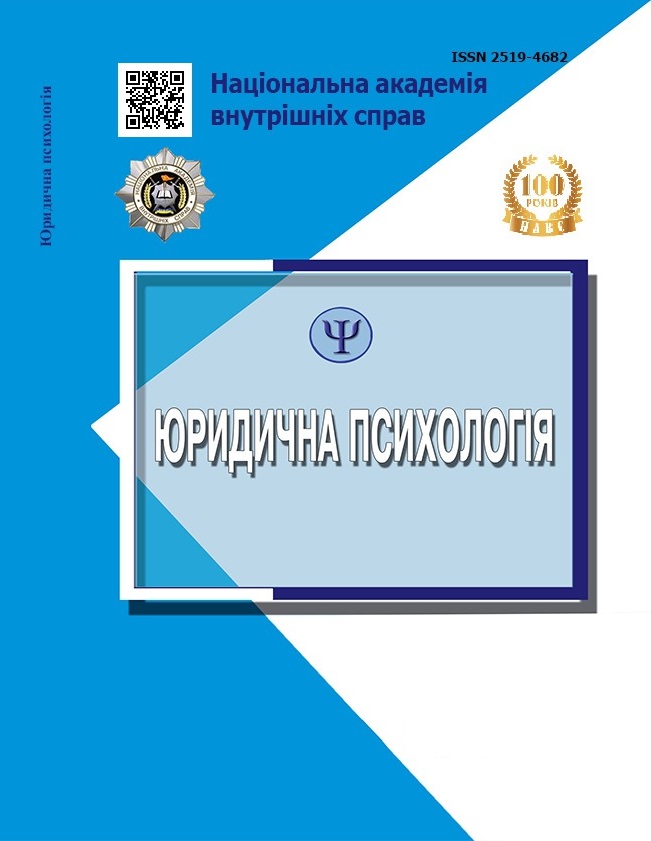Psychological Views of Pythagoras
Abstract
The purpose of this article is to clarify the origins of the history of psychology, to return to the person of the first European thinker, philosopher, scientist, creator of the universal system of knowledge where psychology was
first presented. The methodology of this study is the author’s denial of the «pyramidality» of methodologies and advocating a «horizontal» polymethodological approach, where the creator of the methodology and methodology of scientific research is the scientist himself (see the author’s publications in the journal «Legal Psychology» No. 1 (7) in 2010, No. 2 (12) in 2012, No. 1 (15) in 2014, etc.). In addition, the author used a logical methodology in writing the article, as well as the method of hermeneutics and the historical method. The presented material is marked by scientific novelty because in the history of psychology the figure of this Thinker is mostly ignored. There is almost no mention of Pythagoras. Conclusions: information about the creative heritage of Pythagoras is contradictory. It is sometimes claimed that he did not write anything, other sources indicate that Pythagoras wrote three, six, eighteen treatises. However, the fact is that in all lists of his works there is a mention of the treatise «On the Soul», the text of which has come down to us. Analysis of this treatise gives grounds to consider Pythagoras the discoverer of psychology and its place in the system of sciences. It is believed that, as in many other matters, Plato, Aristotle, Empidocles, Democritus and other ancient thinkers creatively used the legacy of Pythagoras, including that part of it that relates to psychology.
Keywords: psychology; soul; sensations; thinking; consciousness; psyche.
Downloads
References
Большая психологическая энциклопедия / [А. Б. Альмуханова и др.]. М. : ЭКСМО, 2007. 544 с.
Аристотель. Сочинения в четырех томах. М. : Мысль, 1976. Т. 1. 550 с.
Блаватская Е. П. Теософский словарь. М. : Золотой век, 1994. 599 с.
Brumbaugh R. S. Genetic theory in the Pythagorean school. Journal of Heredity. 1952. Vol. 43. Issue 2. P. 86–88. doi: 10.1093/oxfordjournals.jhered.a106276.
Ferrari M. Review of the book «Psychology: Pythagoras to present» by J. C. Malone. Canadian Psychology. 2010. Vol. 51. Issue 3. P. 216. doi: 10.1037/a0020347.
Халапсис А. В. Виза на небеса: Орфей, Пифагор и бессмертие. ScienceRise. 2016. № 8 (1). С. 60–65. doi: 10.15587/2313-8416.2016.75516.
Hawking S. W. Brief answers to the big questions. London : Hodder & Stoughton, 2018. 256 p.
Hergenhahn B. R. Pythagoras. An Introduction to the History of Psychology. 6th ed. Belmont : Wadsworth, Sengage Learning Inc., 2009. P. 34–35.
Kaku M. Physics of the Future: How Science Will Shape Human Destiny and Our Daily Lives by the Year 2100. Washington : Amazon, 2012. 480 p. doi: 10.5860/choice.49-0926.
Лаэртский Д. О Жизни, учениях и изречениях знаменитых философов. М. : Мысль. 1979. 620 с.
Лебедев А. В. Фрагменты ранних греческих философов. М. : Наука, 1989. Ч. 1 : От этических теокосмогоний до возникновений атомистики. 576 с.
Липов А. Н. О «несоизмеримых сущностях» в философии пифагорейцев. К философским основаниям иррациональных пропорций в науке и культуре. Философская мысль. 2018. № 11. С. 93–110. doi: 10.25136/2409-8728.2018.11.26855.
Luchte J. Pythagoras and the Doctrine of Transmigration: Wandering Souls. Continuum: Studies in Ancient Philosophy. 1th ed. London ; Oxford : Bloomsbury Publ., 2009. 224 p.
Malone J. C. Jr. Psychology: Pythagoras to Present. Cambridge : The Mit Press, 2009. 576 p.
Michell J. Qualitative research meets the ghost of Pythagoras. Theory & Psychology. 2011. Vol. 21. Issue 2. P. 241–259. doi: 10.1177/0959354310391351.
Murphy G. Pythagorean number theory and its implications for psychology. American Psychologist. 1967. Vol. 22. Issue 6. P. 423–431. doi: 10.1037/h0024694.
Пифагор. Золотой канон. Фигуры эзотерики. М. : ЭКСМО-Пресс, 2001. 448 с.
Ременць В. А. Історія психології: Стародавній світ. Середні віки. Відродження : навч. посіб. Київ : Либідь, 2005. 916 с.
Психологічний тлумачний словник найсучасніших термінів / під кер. В. Б. Шипаря. Харків : Прапор, 2009. 672 с.
Психологічна енциклопедія / авт.-упоряд. О. М. Степанов. Київ : Академвидав, 2006. 424 с.
Abstract views: 699 PDF Downloads: 558
- Authors reserve the right to authorship of their own work and transfer to the magazine the right of the first publication of this work under the terms of the Creative Commons Attribution License, which allows other persons to freely distribute published work with mandatory reference to authors of the original work and the first publication of an article in this magazine.
- Authors have the right to enter into separate additional agreements on non-exclusive dissemination of the work in the form in which it was published in the journal (for example, to post an article in the institution's repository or to publish as part of a monograph), provided that the link to the first publication of the work in this journal is maintained.
- The journal's policy allows and encourages the posting of articles by authors on the Internet (for example, in electronic storehouses of institutions or on personal websites), both before the submission of this manuscript to the editorial office and during its editorial processing, as this contributes to the creation of a productive scientific discussion and positively affects the efficiency and dynamics of citing the published work.




